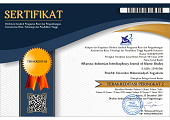‘Becoming a Reflective Educator?’: An Analysis of the Individual Career Trajectory and the Importance of Reflection for Islamic Educators
Abstract
This article covers scaffolding efforts done by the writer to be a reflective educator in the middle of educational condition which is often stopped, routine and less innovative. By depending on the stages of carrier of being educator, some important inventions can be showed that between the first stage of carrier and the stage toward maturity in educating, it can be found a time of carrier transmission making ones be wary and alien to the carrier chosen. This stage must be passed by some actions not only having self reflection but also learn and adopt critically toward the best innovation and model done by other colleges. Moreover, some creativities and innovations also need to be developed, so the carrier of being an educator becomes the important choice in one’s life. This article also explains that a skill of reflection and improving the quality of work is an Islamic action for every Moslem which is having educational profession.
Keywords
Full Text:
PDFReferences
Barnes, L.P. and Wright, A. (2006). Romanticism, representa- tions of religion and critical religious education, British Journal of Religious Education, 28 (1), pp. 65-77.
Brown, GTL, Lake, R. and Matters, G. (2009) Assessment policy and practice effects on New Zealand and Queensland teachers’ conceptions of teaching, Journal of Education for Teaching, 35 (1), pp. 61-75.
Chen, A. and Maanen, John Van. (1999). The Reflective Spin: Case Studies of Teachers in Higher Education Transform- ing Action. Singapore: World Scientific Publishing Co.Pte. Ltd.
Cheng, MMH, Cheng, AYN and Tang, SYF (2010) Closing the gap between the theory and practice of teaching: implications for teacher education programmes in Hong Kong, Journal of Education for Teaching, 36 (1), pp. 91- 104.
Chitpin, S., Simon, M., and Galipeau, J. (2008) Pre-service teachers’ use of the objective knowledge framework for reflection during practicum, Teaching and Teacher Education, 25, pp. 2049-2058.
Day, C. (1999) Developing Teachers: The Challenges of Lifelong Learning. London: Falmer.
Ghaye, T. (2010) In what ways can reflective practices enhance human flourishing?, Journal Reflective Practice, 11 (1), pp. 1-7.
Harrison, J., and McKeon, F. (2009) Perceptions of beginning teacher educators of their development in research and scholarship: Identifying the ‘turning point’ experiences, Journal of Education for Teaching, 36 (1), pp. 19-34.
Hedberg, P.R. (2009) Learning through reflective practice: Applications to educate the reflective manager, Journal of Management Education, 33 (1), pp. 10-36.
Hornbey, G. (2009) The effectiveness of cooperative learning with trainee teachers, Journal of Education for Teaching, 35 (2), pp. 161-168.
Kassem, D. and Murphy, L. (2009). Faith schools: Diversity or division? In D. Kassem and D. Garratt (Eds) (Ch. 5, pp. 70-82). Exploring Key Issues in Education. London: Continuum.
Lampert, M. (2009) Learning teaching in, from and for practice: What do we mean?, Journal of Teacher Education’, 61 (1-2), pp. 21-34.
Malm, B. (2009) Towards a new professionalism: enhancing personal and professional development in teacher education, Journal of Education for Teaching, 35 (1), pp. 77-91.
Minott, M.A. (2010) Reflective teaching as self-directed professional development: building practical or work- related knowledge, Professional Development in Education, 36 (1-2), pp. 325-338.
Murray, J., Jones, M., McNamara, O. and Stanley, G. (2009) Capacity: expertise x motivation x opportunities: factors in capacity building in teacher education in England, Journal of Education for Teaching, 35 (4), pp. 391-408.
Ng, P. T. and Tan, C. (2009) Community of practice for teachers: sensemaking or critical reflective learning?, Reflective Practice, 10 (1), pp. 37-44.
Parkison, P.T. (2009) Field-based preservice teacher research: Facilitating reflective professional practice, Teaching and Teacher Education, 25, pp. 798-804.
Pelliccione, L., and Raison, G. (2009) Promoting the scholarship of teaching through reflective e-portfolio in teacher education, Journal of Education for Teaching, 35 (3), pp. 271-281.
Pollard, A. (Ed.) (2002) Readings for Reflective Teaching. London: Continuum.
Pollard, A., Anderson, J., Maddock, M., Swaffield, S., Warin, J., and Warwick, P. (2008) Reflective Teaching. London: Continuum.
Shoffner, M. (2009) The place of the personal: Exploring the affective domain through reflection in the teacher preparation, Teaching and Teacher Education, 25, pp. 783-789.
Snowball, L. (2007) Becoming more internationally-minded: International teacher certification and professional development (Ch. 21, pp. 247-255). In M. Hayden, J. Levy and J. Thompson (Eds.) (2007) The SAGE Handbook of Research in International Education. London: SAGE Publication Ltd.
Smyth, J. (Ed.) (1995) Critical Discourse on Teacher Develop- ment. London: Cassel.
Wallace, S. (2009) Oxford Dictionary of Education. Oxford: Oxford University Press.
http://en.wikipedia.org/wiki/Transcendentalism, down- loaded on 4/4/2012.
DOI: https://doi.org/10.18196/aiijis.2012.0002.14-24
Refbacks
- There are currently no refbacks.
Copyright (c) 2015 Afkaruna: Indonesian Interdisciplinary Journal of Islamic Studies

This work is licensed under a Creative Commons Attribution-ShareAlike 4.0 International License.
Afkaruna: Indonesian Interdiciplinary Journal of Islamic Studies indexed by:












1.png)


